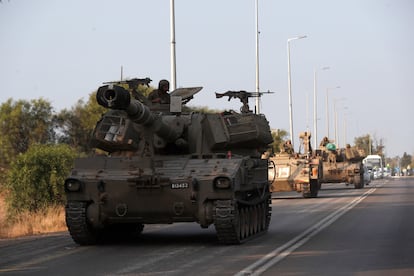Why powerful Israel did not see the Hamas attack coming
Analysts believe the success of the surprise operation by the Gaza militias lies in Israel’s overconfidence and the lack of intelligence information and preparation in the middle of the Jewish holiday

In 1973, when Arab countries attacked Israel by surprise during the Jewish holiday Yom Kippur, just as the Gaza militants did on Saturday, taking advantage of the end of Sukkot, it destroyed in just a few days the so-called conseptsia — the consensus among intelligence services that Israel’s neighbors would not launch a war because they understood that it was a lost cause. Six years earlier, the Jewish state had scored a euphoric win in the Six-Day War, in which the Israeli military took Gaza and Sinai from Egypt; East Jerusalem and the West Bank from Jordan, and the Golan Heights from Syria. But Egyptian forces also surpassed at record speed the famous Bar Lev Line, a series of fortifications east of the Suez Canal, which until then had been considered impregnable. In fact, Israel was relatively close to defeat, until the United States sent the country 93 combat aircraft and 26,000 tons of equipment. This was just two days after the then prime minister Golda Meir described the panorama on the battlefield as “absolutely terrible.”
On Saturday, 50 years and one day since the Six-Day War, another conseptsia in the Jewish state collapsed: that the wall on the border with Gaza — in which it has invested billions of dollars and placed sophisticated surveillance systems — was also practically impassable. It believed that its control of communications and network of informants on the ground would allow it to anticipate an attack of such magnitude, and that, regardless of what day of the year it is, the Israeli Army is one of the most powerful in the world. But, above all, it believed that Hamas — the Islamist movement that does not recognize the Jewish state and has governed Gaza since 2007 — was more interested in maintaining stability in the impoverished Gaza Strip and in preserving the 18,000 work permits in Israel for Palestinians than in engaging in a new escalation of violence, due to the deterrent effect of the foreseeable response.
“Hamas managed to deceive Israel for months, with a distraction strategy, in which it was preparing the operation,” says Uzi Rabi, director of the Moshe Dayan Center of the Center for Middle Eastern and African Studies at Tel Aviv University, who defines the Hamas attack as a strategic and military “fiasco” for Israel. “It is both a triumph for Hamas and a failure for Israel. The numbers [of dead and kidnapped] have never been seen before. October 7, 2023 is going to be a date as historically important as October 6, 1973.”
At least 700 Israelis have died and dozens more are estimated to have been abducted. It is the first attack since the war that followed the creation of Israel in 1948 in which the enemy has been able to infiltrate the country. Daniel Hagari, the spokesperson of the Israeli Defense Forces, said Sunday that militia members are still in Israeli territory.
How could Israel — with all its human, technological and military resources and its informants in the Gaza Strip which has been blockaded for more than a decade — not foresee an action that had been in the works for months? “It has been a great failure of the intelligence and preparation services, but also a problem of concept: of assuming that Hamas did not want an escalation,” says Rabi.
Reserve Lieutenant Colonel Kobi Lavie, former head of the Palestinian affairs branch in the Israeli Ministry of Defense agency that manages civil affairs in Gaza and the West Bank (COGAT), where he was also responsible for intelligence services, disagrees. “It is impossible to organize an operation of this magnitude in Gaza without Israel knowing about it. The intelligence information existed. What has failed is the understanding of that information. There has been talk of a war for three or four months. But it is impossible for any army to be permanently prepared for something that it does not know when will happen.”

Lavie gives as an example the Iron Dome rocket shield, whose batteries are deployed based on the perception of danger. In just a few hours, the Gaza militias launched an unprecedented number of rockets: 3,000, according to the Israeli Army; 7,000, according to Hamas.
It was, above all, a diversionary maneuver to distract from the real objective: entering Israel. The militants first attacked the military posts on the border wall, which gave rise to unprecedented images, such as an excavator breaking down part of the barrier. Palestinians are prohibited from approaching the border wall. In the so-called Great March of Return of 2018 and 2019, Israeli snipers killed more than 300 Palestinians who were protesting in front of the wall. Hamas also took advantage of gaps in the wall, flew over it with paragliders and entered Israel through the Mediterranean Sea, guarded a few miles away by the Navy. Once in Israel, they advanced, killing and kidnapping civilians, police and soldiers, recording videos, walking and chanting slogans with hardly any resistance, as if they were not in one of the countries with the highest military spending per capita in the world.
“From a military point of view, there was a similar approach to that of 1973, despite the differences. And it was that Hamas did not want to alter the status quo, except to create a bit of trouble to [force] Qatar [to increase its economic support], but it was not preparing anything big,” says Lavie. “I have no doubt that Hamas itself was surprised by the ease with which it was able to enter,” he adds.
There is also the issue of Israeli Prime Minister Benjamin Netanyahu’s judicial reform. It is the elephant in the room, which few mention at a time of national unity. The heads of the two main opposition parties, Yair Lapid and Benny Gantz — both critics of the reform — have proposed that Netanyahu form an emergency government in the face of the coming war. For months, military commanders and former heads of the intelligence services had been warning that the deep political and social schism unleashed by the controversial reform was seen as a sign of weakness by Israel’s enemies. Not only because of the country’s internal divisions and the massive weekly demonstrations that have been taking place since January, but also because army reservists have refused to serve.
The leader of the Lebanese Shiite militia Hezbollah, Hassan Nasrallah, summed this up last July, when Israel’s Parliament approved the first key law of the reform. “Israeli society — which thought that its army would not be defeated and that the state must stretch from the Nile to the Euphrates, and that Israel is a regional power — began to deteriorate in terms of its faith, its consciousness, its self-confidence and confidence. This is what puts it on the path of collapse, fragmentation and disappearance, God willing,” he said in a televised speech. Amit Segal, one of the main Israeli political commentators, tweeted on Saturday: “We forgot to be brothers and received a war.”
Humiliated by hundreds of men trapped in 140 square miles, Israel is now focused on a response, which in the words of Netanyahu, “will continue with neither limitations nor respite until the objectives are achieved.”
On Sunday, Hagari said: “There will be a time for hard questions and tough investigation, but now we are at war.” In 1973, the Agranat Commission examined the errors that facilitated the pincer attack by Syria and Egypt at the beginning of the Yom Kippur War. When its first conclusions were known, Golda Meir resigned.
Sign up for our weekly newsletter to get more English-language news coverage from EL PAÍS USA Edition
Tu suscripción se está usando en otro dispositivo
¿Quieres añadir otro usuario a tu suscripción?
Si continúas leyendo en este dispositivo, no se podrá leer en el otro.
FlechaTu suscripción se está usando en otro dispositivo y solo puedes acceder a EL PAÍS desde un dispositivo a la vez.
Si quieres compartir tu cuenta, cambia tu suscripción a la modalidad Premium, así podrás añadir otro usuario. Cada uno accederá con su propia cuenta de email, lo que os permitirá personalizar vuestra experiencia en EL PAÍS.
¿Tienes una suscripción de empresa? Accede aquí para contratar más cuentas.
En el caso de no saber quién está usando tu cuenta, te recomendamos cambiar tu contraseña aquí.
Si decides continuar compartiendo tu cuenta, este mensaje se mostrará en tu dispositivo y en el de la otra persona que está usando tu cuenta de forma indefinida, afectando a tu experiencia de lectura. Puedes consultar aquí los términos y condiciones de la suscripción digital.









































